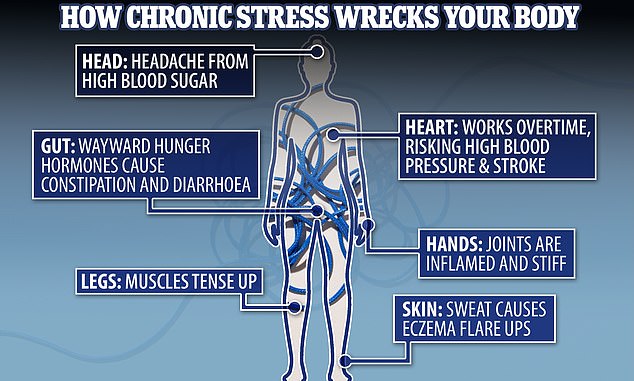Years of smoking, excessive drinking and overeating are all factors that can cause cancer.
Over time, these habits are thought to damage DNA and weaken our body’s defenses, creating the perfect environment for tumors to form.
But some research suggests that a single traumatic event may be linked to the development of this deadly disease years later.
A bitter divorce, a death in the family or a serious injury can leave a lasting impression on you, weakening your response to stress for the rest of your life and potentially increasing your risk of cancer.
Women who had experienced a traumatic event, such as a car accident or assault, and had symptoms of PTSD had twice the risk of developing ovarian cancer compared to women who had not been traumatized, according to a 2019 study of more than 54,000 women.

Studies on the link between stress and cancer have produced mixed results. But some doctors believe that stress may indirectly increase cancer risk by weakening the immune system and making people more likely to engage in behaviors such as smoking.
A 2022 study of 278 patients found that the majority of patients diagnosed with head, neck, and pancreatic cancer had experienced another major stressful life event within five years of being diagnosed with their cancer.
Other research, however, has found less conclusive links between cancer and stress. A 2016 study of more than 100,000 women in the UK found no link between adverse life events and breast cancer risk.
Studies like these lead Dr. Andrea Lynne Roberts to believe that the link between cancer and stress is not very strong, scientifically.
It’s true that stressful events that lead to post-traumatic stress disorder or ongoing emotional problems can affect your health and increase your risk of developing a host of medical problems. The link between stress and heart disease, for example, is much stronger than the link to cancer, Dr. Roberts said.
“I think if you have high stress levels, cancer is not the thing you should be worrying about,” she said.
Despite these reservations, scientists have been studying the link between cancer and stress for decades.
“It can have a profound impact on how your body’s systems function,” said Dr. Lorenzo Cohen, director of the integrative medicine program at MD Anderson. The best guess we have is that “stress makes your body more hospitable to cancer,” Dr. Cohen said, meaning it weakens your body’s natural defenses against cancer and other diseases.
Short-term stress, which you might feel when you’re running errands, before speaking in public, or before preparing to exercise, probably doesn’t increase your cancer risk.
Your body can handle brief moments of stress.
However, a single traumatic event can lead you to develop depression, anxiety or post-traumatic stress disorder, all of which can lead to lifelong stress problems, according to the NIH.
This is called chronic stress. You can suffer from it over a prolonged period of time, in a toxic work environment, due to childhood trauma, or due to unemployment.
Chronic stress is what doctors believe is actually causing the cellular changes in your body that could eventually lead to cancer, according to Dr. Cohen.
That’s because when you’re under this type of stress, your body is constantly producing hormones like cortisol and adrenaline. This triggers the body’s “natural alarm system,” according to the Mayo Clinic.
These chemicals make your heart beat faster, raise your blood pressure, and increase the amount of sugar in your blood to give you more energy.
They also buffer systems in your body that aren’t immediately needed in a fight-or-flight scenario — reserving energy that would be used to, say, support your immune system to send blood to your muscles, allowing you to move faster.

In short-term stress, these effects disappear quickly.
But if you can’t calm down for a long period of time, it can take a toll on your body, weaken your immune system, make you depressed and cause digestive issues, said Anil Sood, MD, professor of gynecologic oncology and reproductive medicine at MD Anderson.
This potentially makes it easier for cancer to grow, both because it increases the risk of diseases like heart disease and diabetes, which can lead to cancer, and because the stressed immune system is less prepared to fight cancer.
“Chronic stress can also promote the growth and spread of cancer in several ways,” Dr. Sood said.
It could be that when a person is stressed, they are more likely to act in ways that increase their cancer risk – by starting to smoke, drink or give up exercise, according to the National Cancer Institute (NCI).
This shouldn’t make people facing a cancer diagnosis feel guilty, said Dr. Daniel Bruetman, a medical oncologist at City of Hop Cancer Center in Chicago.
“They may think that if they had had ‘less stress’ they would not have had cancer or that the treatments would have worked,” Dr. Bruetman said.
In reality, the link is unclear, and no one should feel guilty about their stress – there are many other factors that could play a bigger role in your likelihood of developing cancer, such as genetics, eating habits and exercise.
Also, don’t think that just because you had a bad day you’re doomed to develop cancer, Nicole Andrews, a registered dietitian specializing in oncology, said in a TikTok.
“We all face stress in our lives. Don’t think that if you have had a stressful day you’re going to get cancer,” Andrews said.
You can, however, do your best to learn how to manage chronic stress, Dr. Cohen said.
For some people, this may be as simple as getting rid of a toxic person. But for others, managing stress may involve seeking therapy, practicing meditation or improving sleep habits, Dr. Cohen said.
He is particularly interested in sleep and says that “getting eight hours of sleep a night is a great defense against stress.”